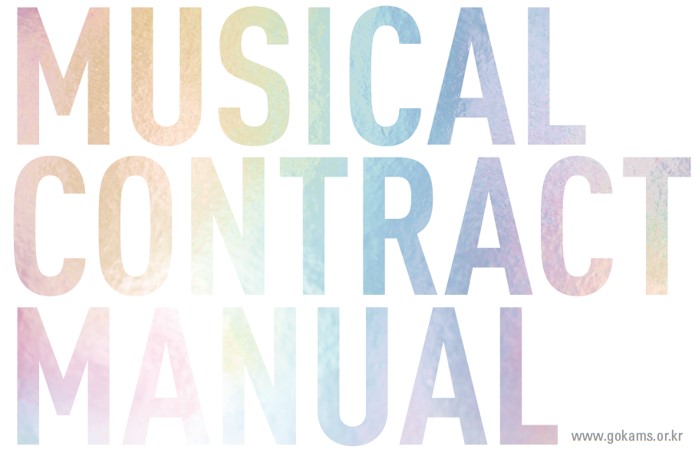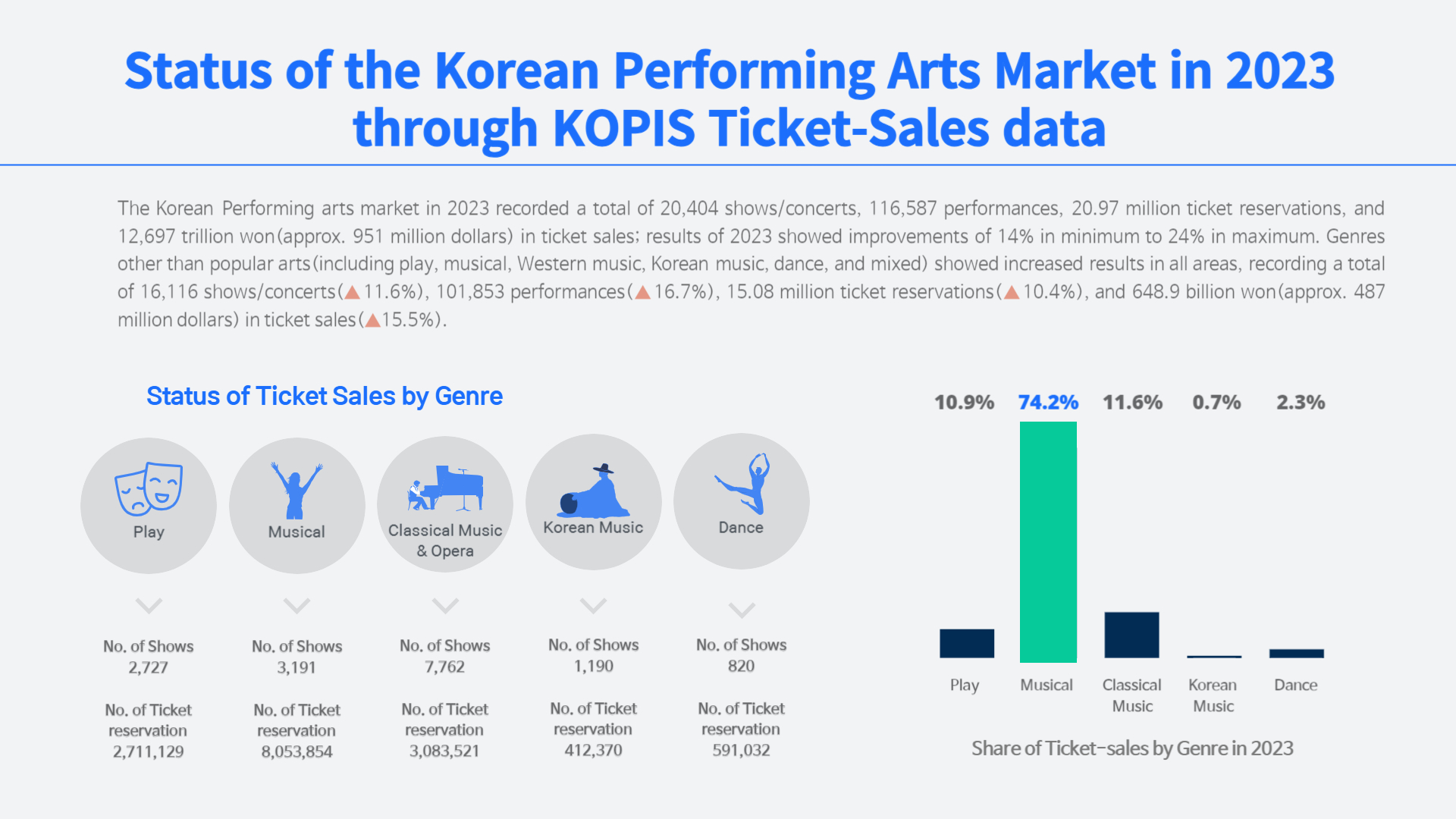Contracts Determine the Success or Failure of Creative Musicals Going Global
Um Dong-ryul / Director of Korea Institute of Performing Arts Industry
Despite its short history, Korea’s musical market began to grow rapidly in 2018 and the market’s sales volume reached 400 billion won in 2019, thus making musical theater one of the most important genres in Korea’s cultural content industry. Along with such rapid growth, the number of musicals increased beyond the potential of the market’s demand. This resulted in oversupply of Korean musicals and excessive competition.
Overall, the Korean musical market is still dominated by licensed or original musicals. Most of licensed musicals are presented at large theaters. Nevertheless, the market of creative musicals is also growing noticeably. Indeed, creative musicals are overtaking licensed musicals in terms of the number of performances staged annually. Recently, creative musicals have also been presented at large theaters more and more but most of them are still performed at medium and small-sized theaters. Put differently, the number of creative musicals is larger but the sales volume of licensed or original musicals, which are still presented mostly at large theaters, represents a large part of the total sales of musicals. In that sense, creative musicals relatively have unfavorable conditions when it comes to investment and the size of the audience.
Under these circumstances, the creative musical market needs the following efforts. First, the market should seek the expansion and growth of production companies. Second, it should make both internal and external efforts to improve the competitiveness of musicals’ quality. Third, it needs sound and transparent investment capital. Lastly, the market should not only develop new musicals that could be performed in a greater variety of projects in Korea while also exploring overseas markets. For example, Korean creative musicals could seek overseas localization, licensing and co-production with international partners. This could lead to diversifying revenue sources and to strengthening creative musicals’ internal capacity.
For this reason, many experts are suggesting Korea’s creative musicals going global as a new way of addressing the problems of the country’s performing arts market. However, as a growing number of creative musicals make inroads into the global market, the number of production companies making losses also increase. There are several reasons for such losses. First, production companies lack legal knowledge and experience. Second, they don’t have legal consultants who could help them sign contracts properly. Third, they end up signing unjust or wrong contracts.
Despite Korean Musicals’ Active Presentation in China, Neither Manuals Nor Sample Contracts Exist
Particularly since 2016, the number of Korea’s licensed performances in China has increased year after year. Nonetheless, there is no standardized licensing contract. So for licensing of Korea’s creative performances, the contracts are often established by the Chinese parties in Chinese. Or, even for Korea’s creative musicals going global, many contracts were drawn up in Chinese and English, without any Korean version. Moreover, the concept of copyright and economic right ins’t firmly established in China. So if a performance is stopped after signing a contract unreasonably requiring exclusive rights, a new contract cannot be signed in some cases.
Meanwhile, Korea’s creative musicals are going global in a greater variety of ways. In addition to touring and licensing, co-production and overseas investment also make Korean performances meet global audiences. Despite this, Korean production companies don’t’ have any professional team in charge of legal affairs regarding contracts. Consequently, unreasonable contracts are signed frequently.
Contract: Yardstick Determining Success or Failure
For overseas presentation of a creative musical, establishment and wording of a contract involve the principle of private autonomy. In other words, a contract is a “promise” between a production company and an organization that are capable of doing legal activities. Through such a “promise,” the two parties clarify their rights and duties and agree to fulfill their duties. When a production company of a creative musical carries out a series of activities including licensing, overseas touring, co-production and overseas investment, a contract has the biggest influence on the whole process. A contract is also a yardstick determining the success or failure of a project.
For example, let’s say that a production company of a creative musical is planning to enter the global market. To do so, the company invests great costs and efforts to select a co-producer. The company then signs an MOU with the co-producer, conducts a feasibility study and signs a contract between the two parties for co-production. But after all this procedure, the company’s confidential information is disclosed in a totally unexpected way. The two parties end up not trusting each other anymore and this could result in damage to the Korean production company. That is because of the wording in the contract. In the “confidentiality” clause, if a sentence uses the word “may” instead of “shall,” that clause of the contract doesn’t have any legal force. Therefore, when a production company draws up a contract for overseas presentation of its creative musical, it is important to take note of the following crucial matters: 1. languages of the contract, 2. governing law applied for legal interpretation and 3. jurisdiction for dispute.
Under these circumstances, the development of the “Musical Contract Manual” came to be launched in the following three directions.
First, the manual seeks to apply the law of the Republic of Korea to the “governing law,” which forms the basis of legal interpretation, and to the “jurisdiction” of contracts.When it comes to contracts for overseas presentation of creative musicals, the production companies or performances are all different so it is natural that the clauses of the contracts are different. However, what is the most basic is to determine the governing law. In a contract, the governing law specifies the validity of the contract, the parties’ rights and duties and the formal procedure they must respect to fulfill these duties. In most countries, the party that initiates a contract is allowed to determine the governing law. If the governing law isn’t clarified, there may be a dispute between the parties due to the differences in the two countries’ laws. Despite this, the party initiating a contract needs to specify the “governing law” in the contract in order to reduce the probability of dispute. By doing so, the party initiating the contract can evaluate the risk that may arise after signing the contract. Or, the party can decide more easily whether to modify the clauses in the contract.
The second direction of the manual consists in forming an advisory committee of 16 members. The members of this committee are experts of the performing arts scene who have been directly involved in production of creative musicals and relevant contract clauses. This was to reflect different opinions and voices from the performing arts scene.The advisory committee is divided into four teams in charge of musical production, musical creation, overseas distribution and investment in musicals respectively. In addition, the committee also has accounting experts in order to develop a manual on the basis of Korea’s tax law and accounting law for foreign exchange transactions that are carried out when signing a contract. In this regard, the manual provides guidelines on how to deal with tax and accounting issues that could arise from a contract.
The manual’s third goal is to be actually used by Korean production companies. The manual is the result of analyzing the existing contracts of creative musicals that were presented abroad successfully and comparing them with contracts in other fields seeking entry into the global market. In the process of developing the manual, four advisory meetings took place and each of the advisory committee’s teams provided advice and reviews for the other teams. This was to help contractors use such information on the spot. After that, legal experts and those specializing in other fields participated in the final review of the manual, thus bringing the manual to perfection.

Musical Contract Manual Co-Produced by the Korea Arts Management Service and Korea Association of Performing Arts Producers ⒸKAMS
Developing the musical contract manual in these directions, we analyzed the existing contracts of Korean musicals and overseas presentation contracts of other genres of the preforming arts (e.g. plays, non-verbal performances and dances) in a comprehensive manner. As a result, we came up with four sample contracts and guidelines for original tours, licensing, co-production and investment for creative musicals. Furthermore, we made efforts to prepare a contract manual that could be applied to different types of overseas distribution and investment in and out of Korea. We also tried to provide guidelines that could enable musical production companies to respond to injustices and relevant issues when signing a contract for overseas presentation.
Nevertheless, this manual would not be used as a standard to solve all problems related to international contracts in the musical scene. That is because the principle of private autonomy applies to a contract and its wording. Consequently, conditions required by a contract may differ depending on the production company’s situation, contract conditions as well as the size and style of the musical in question. Conditions of overseas presentation contract may also change according to the following factors: financing of the creative musical, conditions of the investment contract and the existing contracts signed with the creators, performers, design staff and technical staff.
But from a medium and long-term perspective, it is very meaningful to develop a manual for overseas presentation contracts of Korea’s creative musicals on the basis of the Korean governing law in order to protect the country’s musical industry and to secure the cultural sovereignty of Korean contractors. For performers who are either working on or dreaming of production of creative musicals, the manual will share the experiences of those who already signed international contracts because it includes the real contracts of the existing creative musical companies who have played a pioneering role in the international projects of musicals.








 PREV
PREV
.jpg)
.jpg)



.jpg)
.jpg)
.jpg)
.jpg)











